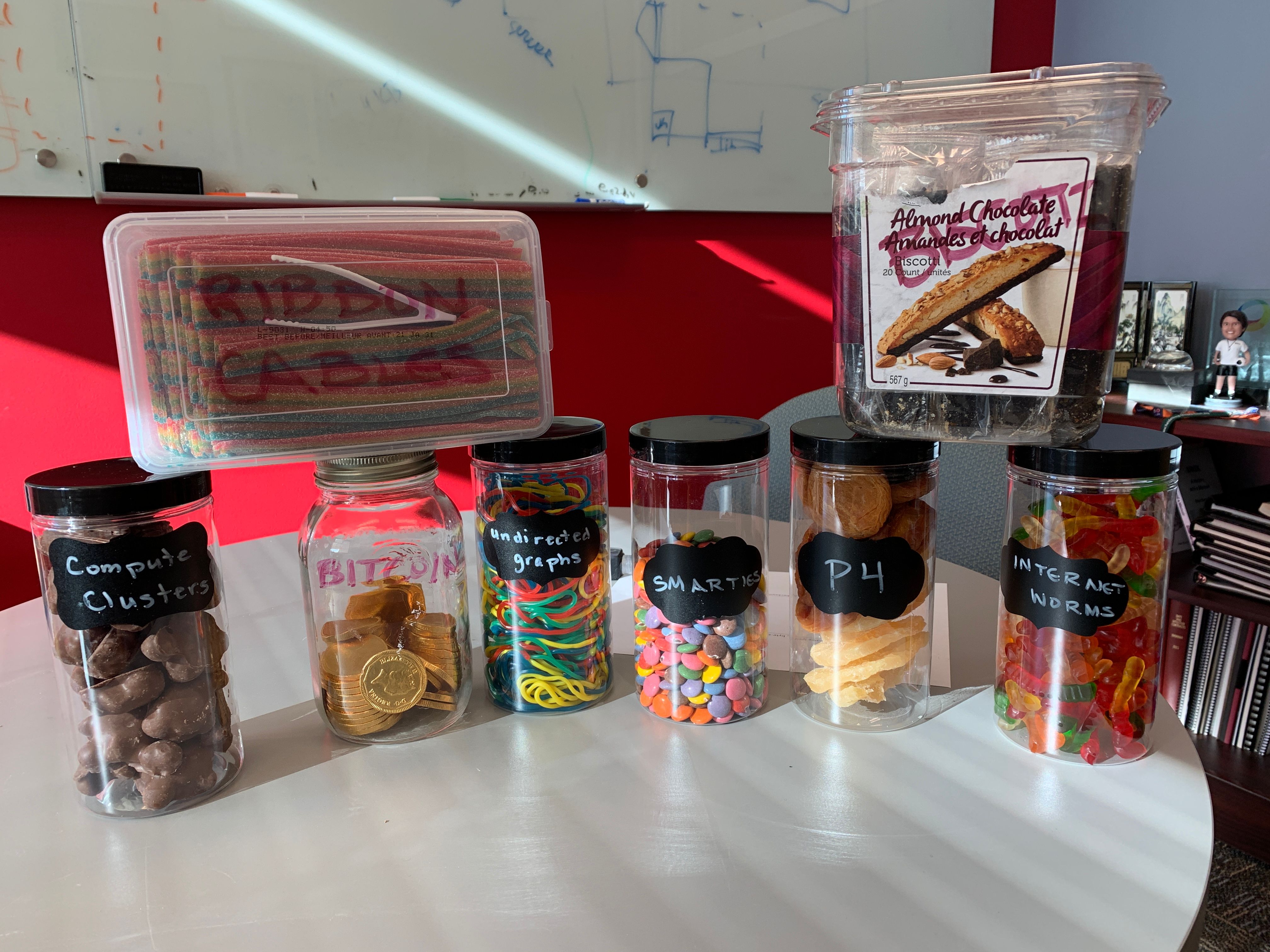
Currently Investigating
Research
We conduct research on a variety of topics, including operating systems, distributed systems, security, data provenance, program analysis, and much more!
Interpretable Machine Learning
We use computational caching as well as novel data structures and algorithms to produce provably optimal solutions to real world NP-hard problems. Our focus is on interpretable, certifiably optimal models.
View Interpretable Machine Learning Projects |
Optimal Rule Lists
Rule lists are a set of easily interpretable solutions to classification tasks. We develop custom discrete optimization techniques to use these interpretable models while remaining competitive with common black box approaches.
Read More
Optimal Decision Trees
We create optimal decision trees for classification tasks. We optimize an objective that includes a penalty on the number of leaves in a tree to favor models that are sparse and interpretable. Sparse decision trees function as an interpretable model with greater flexibility and power than rule lists (the latter being a special case of the former).
Read More
Networked and Distributed Systems
We investigate new design principles in datacenter system design and operation. Our work covers broad areas such as Network Function chain allocation and acceleration, disaggregated datacenters, and using programmable devices to acclerate data analytics workloads.
View Networked and Distributed Systems Projects |
Scheduling Spot VMs in datacenters
Datacenter scheduling of Spot virtual machines
Read More
Datacenter scheduling with networking guarantees
Datacenter scheduling of virtual machines with network guarantees
Read More
Programmable Networks
We use dataplane programmable switches to improve goodput in Network Function chain deployments.
Read More
Privacy
Systems that handle users' data must consider the privacy of that data. We build systems that provide privacy guarantees in the face of various types of threats and also study individual privacy expectations using mixed methods approaches.
View Privacy Projects |
Side-channel security
This research looks at data disclosures due to side channels in cloud services.
Read More
Privacy as trust
Who do we want to share our information with and why? This project looks at the emotional and social dynamics of privacy and trust in intimate relationships.
Read More
Applied differential privacy
We are designing a smart cache that uses synthetic data to allow users to issue more differentially-private queries before depleting their privacy budget.
Read More
Privacy in blockchains
We study transaction source privacy and transaction content privacy in blockchain systems.
Read More
Provenance
We investigate techniques and applications that make data more valuable, from capturing data provenance (a formal history of how data came to be in its present form) to deriving provenance to developing applications that use data provenance. We build tools to facilitate scientific reproducibility and we investigate ways to build systems that are more accountable to the people who develop and use them.
View Provenance Projects |
Visicorn
We offer visual insight into the anomalies triggered by a detection system to assist in performing root-cause analysis.
Read More
Computational Reproducibility
We develop systems that facilitate computational reproducibility for scientific and ML workflows
Read More
Provenance-based Security
We explore the use of system provenance for security.
Read More
Security
We research, develop, evaluate, and deploy tools and systems designed to ensure that system/network security missions can be accomplished successfully despite cyber attacks. We also develop advanced algorithms and techniques for processing big datasets from a range of sources, such as IoT devices and network traffic.
View Security Projects |
CPS Security
We offer techniques for building intrusion detection system for Cyber-Physical Systems (CPSes).
Read More
Side-channel security
This research looks at data disclosures due to side channels in cloud services.
Read More
Visicorn
We offer visual insight into the anomalies triggered by a detection system to assist in performing root-cause analysis.
Read More
ML Security
We study attacks and defenses for distributed machine learning systems
Read More
Provenance-based Security
We explore the use of system provenance for security.
Read More
Self-optimizing Systems
We investigate the use of Machine Learning techniques to design systems able to self-optimize.
View Self-optimizing Systems Projects |
Tuneful
Tuneful is an extension for Spark which optimizes workload configurations starting from a zero-knowledge setting. The more workloads a cluster executes, the better it becomes at executing them. In order to achieve this, we leverage Multi Task Gaussian Process, Similarity Analysis and Significance Analysis.
Read More
SmartTuning
Auto-tuning complex systems configurations for high performance
Read More
Software Engineering for Systems
Complex software systems are difficult to design, implement, tune, debug, and understand. We are working on techniques to address these challenges.
View Software Engineering for Systems Projects |
PGo
We compile Go-based distributed systems from specifications written in a variant of PlusCal.
Read More
Storage
We investigate emerging storage technology such as non-volatile RAM and ultra-dense hard disk drives to match technology characteristics with file system capabilities. We also explore new approaches to namespace management, data organization, and data analytics.
View Storage Projects |
Zoned Storage
Zoned storage devices, such as flash drives and shingled magnetic disks, are divided into units called zones, in which all writes must be sequential. We develop techniques to improve I/O performance on these devices.
Read More
Building Block File Systems
We are redesigning file system implmentation structures to enable synthesis of file system components and automated file system assembly.
Read More
Graph Storage and Processing
We develop systems and algorithms for large scale graph processing and explore novel applications for graph-structured data.
Read More
Persistent Memory
We benchmark Intel Optane Persistent Memory to understand file allocation policies that optimize performance for applications that use persistent memory.
Read More
User Mode File Systems
Traditionally, file systems have been implemented in kernel mode for efficiency and security, albeit at substantially higher development complexity. User mode file systems have existed for decades and suffer from lower efficiency. Why? How can we improve them?
Read More
File System Name Spaces
The hierarchical filesystem namespace originated in the 1950s and was modeled after filing cabinets. While it has served us adequately for decades, we explore alternate namespace paradigms to determine if there are alternatives that can enhance the ability to find and present information to users.
Read More
Synthesizing System Software
We investigate novel techniques for specifying systems components and tractably synthesizing provably correct implementations.
View Synthesizing System Software Projects |
Shellac
Shellac synthesizes compiler rules from specification to implementation languages.
Read More
Tinkertoy
Tinkertoy is a set of modular operating systems components from which one can assemble a custom IoT system.
Read More
Building Block File Systems
We are redesigning file system implmentation structures to enable synthesis of file system components and automated file system assembly.
Read More
COMET
COMET synthesizes reactive hardware and software from UNITY protocol specifications.
Read More
Graph-structured Data
We develop systems, machine learning models, and algorithms for different tasks on large scale graphs and explore novel applications for graph-structured data.
View Graph-structured Data Projects |
Graph Storage and Processing
We develop systems and algorithms for large scale graph processing and explore novel applications for graph-structured data.
Read More
Operating Systems
We improve security and performance of both new and existing operating systems.
View Operating Systems Projects |

Systopia lab is supported by a number of government and industrial sources, including Cisco Systems, the Communications Security Establishment Canada, Intel Research, the National Sciences and Engineering Research Council of Canada (NSERC), Network Appliance, Office of the Privacy Commissioner of Canada, and the National Science Foundation (NSF).